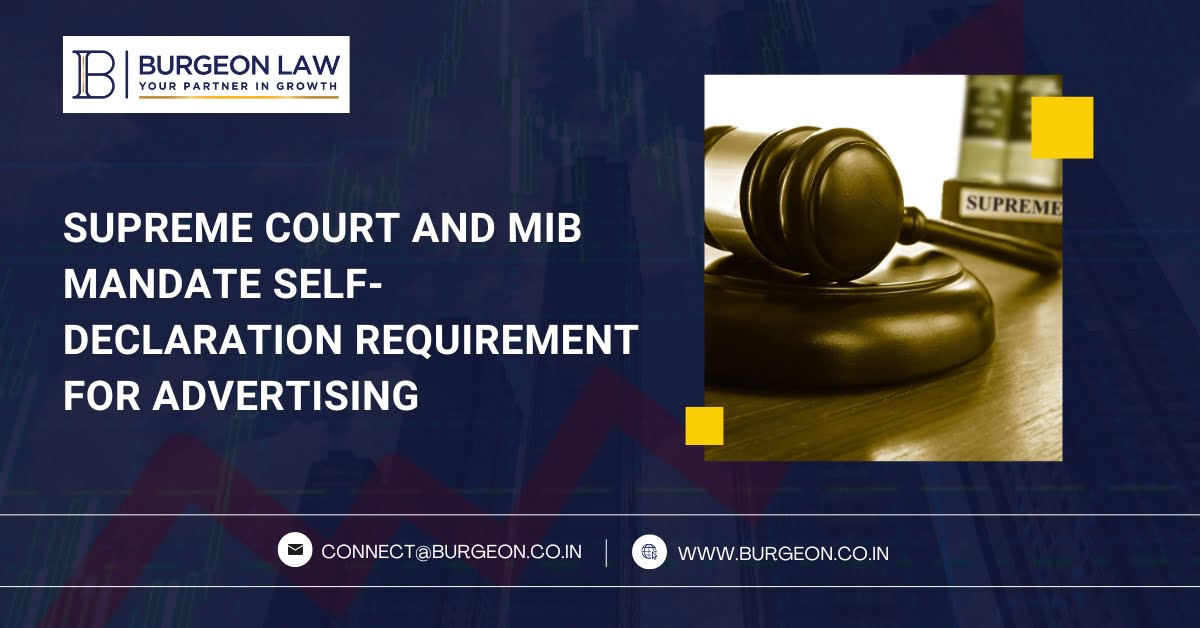The Supreme Court of India has recently issued an order in the case of Indian Medical Association (IMA) vs. Union of India dated May 7, 2024 (“Order”), which takes note of the issue of misleading advertisement and inefficient mechanisms to address the liability of the advertisers/advertising agencies. The Order has triggered a requirement for all advertisers/advertising agencies to submit a self-declaration certificate before publishing/airing/displaying any advertisements in the press/print media/internet.
Pursuant to the Order, the Ministry of Information and Broadcasting (“MIB”) has also issued a press release dated June 3, 2024, reiterating such self-declaration requirement for all advertisements published on or after June 18, 2024.
Table of Contents
ToggleBackground
The instant writ petition was filed by the Indian Medical Association against the Patanjali Ayurved Limited for alleged misleading advertisement regarding efficacy of their products resulting in breach of the Consumer Protection Act, 2019 (“CPA”) and the Drugs and Magic Remedies (Objectionable Advertisements) Act, 1954.
During the proceedings, the bench took note of the number of misleading advertisements that are being published/displayed with little/nil accountability on the part of the manufacturers, promoters and advertisers having the potential to adversely affect the society at large. The Supreme Court while taking note of the extensive framework for preventing misleading advertisements including Guidelines for Prevention of Misleading Advertisement and Endorsement of Misleading Advertisements, 2022 and CPA, observed the absence of any robust mechanism to ensure that the obligations on the advertisers under such guidelines and laws are adhered to. In light of the above the Supreme Court invoked the powers vested in it under Article 32 of the Constitution of India and directed:
a. submission of a self-declaration by the advertiser/advertising agency in lines with Rule 7 of the Cable Television Networks Rules, 1994 before an advertisement is printed/aired/displayed;
b. MIB to create a dedicated portal for submission of such self-declaration form;
c. that the proof of uploading the self-declaration be made available by the advertisers to the concerned broadcaster/printer/publisher/TV;
d. that no advertisement shall be permitted to be run without uploading such self-declaration.
Scope of Self Declaration Certificate
The Self- Declaration Certificate is required for advertisements in various media formats, including television, radio, print and digital/online platforms. The certificate must be uploaded through the following prescribed portals:
- Tv and Radio Advertisements: Broadcast Seva Portal of the Ministry of Information and Broadcasting.
- Print and Digital/Internet Advertisements: Press Council of India’s portal.
Contents of the Self- Declaration Certificate
The Self- Declaration Certificate must affirm that the promotion:
- Does not contain misleading claims: The certificate must guarantee that the promotion does not provide any false information or misleads the consumers about the nature, substance, quantity, quality of the product or service.
- Complies with regulatory guidelines: The advertisements must adhere to Rule 7 of the Cable Television Networks Rules, 1994, and the norms of Journalistic Conduct of the Press council of India. These regulations prohibit advertisements that:
- Deride any caste, race, color and nationality.
- Are against any provisions of the Indian Constitution.
- Incite crime, disorder, violence, or glorify violence or obscenity.
- Exploit social evils or promote intoxicants
Analysis
This directive by the Supreme Court signifies an important step towards enforcing responsible advertising practices and ensuring consumer protection. However, the order and press release has faced adverse reaction from the industry considering submission of self-declaration certificate for each individual advertisement simply adds a rigorous administrative layer, particularly in the digital advertising sphere.
Furthermore, in this digital age, there are many foreign supplier/manufactures who advertise their products to Indians through social media such as Instagram. It is to be seen, whether direction will have extra territorial effect and such foreign advertisers will be required to submit such self-declaration.
Advertisement has evolved massively from its traditional form and meaning of advertisement have been continuously changing. Neither, the order nor the press release defines the term “advertisement”. While, the CPA does define “advertisement”, however, the definition is broadly worded and it is unclear whether product placement, influencer advertisement, advertisement commenting on current affairs, rather than mentioning about product itself, etc. would be covered or not. It is also unclear whether an edited version of an advertisement already self-declared by the advertiser would require to follow the procedure again. While the purpose to hold marketers and advertising agencies accountable for non-compliance with the regulation is understandable, the practical impact on enforceability of this self-declaration requirement is doubtful.
Author: Anish Jaipuriar
Co-Author: Hardik Sabbarwal

